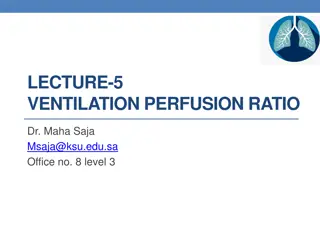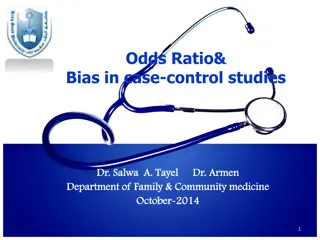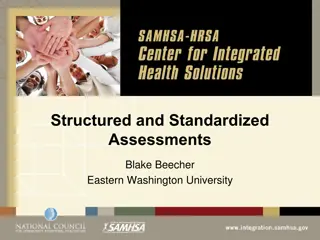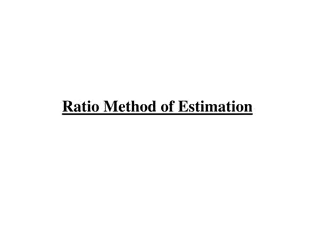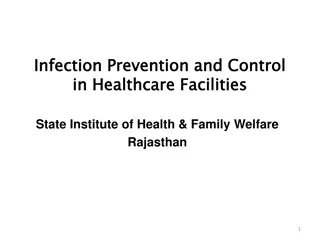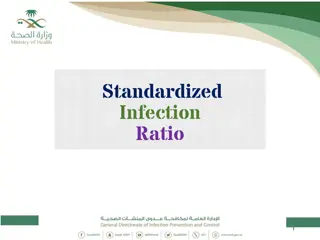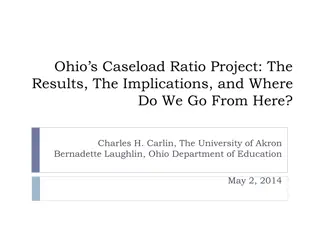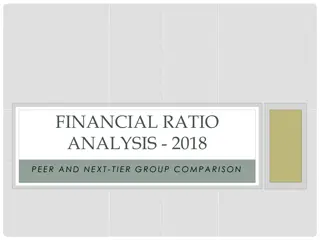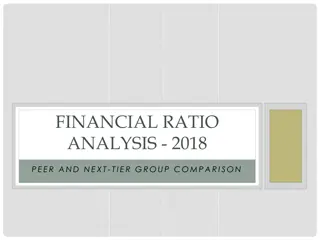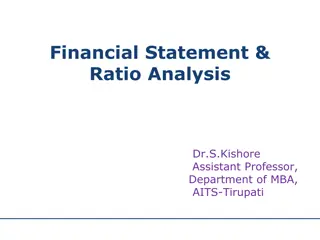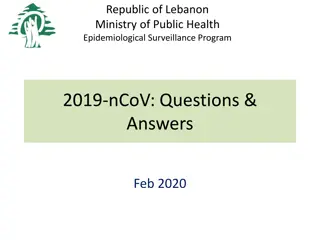Prioritizing Clinically Important Outcomes Using Hierarchical Win Ratio
Clinical trials often use composite outcomes, but conventional analysis methods have limitations in accurately reflecting clinical reality. Hierarchical outcomes offer flexibility by defining a hierarchy of events based on importance. Analyzing trials using hierarchical outcomes involves comparing p
7 views • 20 slides
Understanding Pulmonary Circulation and V/Q Ratio in Respiratory Physiology
Explore the high-pressure and low-pressure circulations supplying the lungs, the concept of physiological shunt in pulmonary circulation, different lung zones based on blood flow, V/Q ratio and its clinical significance, and abnormal V/Q ratio patterns. Delve into the role of pulmonary circulations
11 views • 28 slides
Understanding Infection: Causes, Signs, and Nursing Management
Learn about the definition of infection, common causes, general and specific signs and symptoms, nursing assessment for foot ulcers and pressure injuries, as well as nursing interventions for infection prevention and management. Dive into the stages of infection, general and specific signs and sympt
0 views • 24 slides
Understanding Fibonacci Sequence and the Golden Ratio
Fibonacci numbers are a sequence of numbers starting with 0, 1, where each number is the sum of the two preceding numbers. This sequence, discovered by Leonardo Fibonacci, displays a fascinating relationship to the Golden Ratio when examining the ratios of consecutive numbers. The Golden Ratio, appr
1 views • 55 slides
Understanding Ventilation-Perfusion Ratio in Pulmonary Circulation
This lecture delves into the intricate relationship between ventilation and perfusion in the lungs, highlighting the importance of proper gas exchange for optimal respiratory function. It discusses the circulations supplying the lungs, defines the V/Q ratio, and explores the clinical significance of
0 views • 25 slides
Converting Measurements using Ratio in Math Education
Explore the concept of converting measurements using ratio in Math education. Learn how to convert between customary and metric units through multiplication or division, and solve problems with ratio and proportion. Discover key vocabulary like Customary Unit, Metric Unit, Conversion, Ratio, and Pro
1 views • 23 slides
A Primer on Financial Ratio Analysis and CAHMPAS
This resource by the CAHMPAS Financial Team at University of North Carolina provides an in-depth look into financial ratio analysis, including the theory, types of analyses, and the importance of understanding financial indicators. It discusses how businesses can assess their financial performance a
0 views • 87 slides
Evolution of the Ratio Formationis Generalis in Congregational Formation
Evolution and significance of the Ratio Formationis Generalis in Congregational Formation, from its historical development to the need for updates in response to changes in formation programs and Vatican documents. The formation of Units, Conferences, Directories, and Programs based on the Ratio, hi
4 views • 16 slides
Understanding Ratio Analysis in Financial Statements
Ratio analysis is a crucial process in interpreting financial statements by deriving accounting ratios from the balance sheet and profit and loss account. It involves assessing short-term liquidity, long-term solvency, activity ratios, and profitability ratios. Liquidity ratios like current ratio, q
2 views • 41 slides
Understanding Odds Ratio and Bias in Case-Control Studies
This educational material covers the essentials of odds ratio and bias in case-control studies, including how to construct a 2x2 table, calculate odds ratio, define bias, and interpret results. A specific case study on pesticide exposure and cancer is presented to illustrate these concepts. Readers
2 views • 20 slides
Understanding Structured and Standardized Assessments in Education
Explore the world of structured and standardized assessments with a focus on their role, purpose, and administration. Learn about important factors in selecting measures, interpreting results, and evaluating validity and reliability. Discover the benefits and advantages of standardized measures in e
0 views • 30 slides
Understanding Banking Concepts and Monetary Policies
Explore key banking concepts such as Currency Deposit Ratio, Reserve Deposit Ratio, Statutory Liquidity Ratio, High-Powered Money, and their significance in regulating the money supply and liquidity in an economy. These concepts shed light on the relationship between currency, deposits, reserves, an
0 views • 14 slides
Ratio Method of Estimation in Statistics
The Ratio Method of Estimation in statistics involves using supplementary information related to the variable under study to improve the efficiency of estimators. This method uses a benchmark variable or auxiliary variable to create ratio estimators, which can provide more precise estimates of popul
0 views • 30 slides
Comprehensive Guide to Infection Prevention and Control in Healthcare Facilities
This comprehensive guide outlines the objectives, structure, responsibilities, common sources of infection, and principles of infection prevention and control in healthcare facilities. The program aims to minimize the risk of healthcare-associated infections, enhance healthcare worker adherence to I
0 views • 55 slides
Importance of Collecting Standardized Social Determinants of Health Data
Health centers are focusing on collecting standardized social determinants of health (SDOH) data to address the needs of individual patients and promote social justice. This systematic approach involves gathering qualitative data for every patient, structured data via screening tools, and standardiz
0 views • 28 slides
Ratios in Different Scenarios
Explore and solve various ratio-related problems involving counters, bees, spiders, bread rolls, ladybirds, and spiders. From determining the number of red counters given the ratio to finding out the quantity of bread rolls in multiple baskets based on the provided ratio, these exercises help streng
1 views • 18 slides
Understanding Standardized Infection Ratio (SIR) in Healthcare-Associated Infections
The Standardized Infection Ratio (SIR) is a key measure used to monitor healthcare-associated infections (HAIs) at different levels. It compares observed HAIs with predicted values based on specific risk factors. An SIR > 1 indicates more infections than predicted, an SIR = 1 means observed equals p
0 views • 19 slides
Understanding Standardized Infection Ratio (SIR) in Healthcare
The Standardized Infection Ratio (SIR) is a crucial metric used to monitor Healthcare-Associated Infections (HAIs) at various levels. It allows for improved risk adjustment and comparison by providing a single summary number. Standardization methods like direct and indirect standardization help in a
0 views • 44 slides
Understanding the Epidemic of C. Difficile Infection: Insights and Implications
C. Difficile infection is a growing concern, with a significant impact on public health in the United States. High rates of infection and mortality, particularly among the elderly, highlight the urgent need for effective prevention and management strategies. The burden of C. Difficile infection exte
0 views • 59 slides
Understanding Landslide Susceptibility Using Frequency-Ratio Method
This informative content delves into the Frequency-Ratio Method for Landslide Susceptibility Index (LSI), supported by the National Science Foundation. It explains how Frequency-Ratio (FR) methods are used for analyzing landslide susceptibility, the mathematical calculations involved in determining
0 views • 15 slides
Ohio's Caseload Ratio Project: Results and Implications
Ohio's Caseload Ratio Project explores the history of caseloads in Ohio, the impact of IDEA mandates, and the formation of a Steering Committee to address caseload ratio issues. The study delves into the data collection process, workload determination, and the need for appropriate and defensible cas
0 views • 36 slides
Importance of Standardized Recipes in Restaurants
Standardized recipes ensure consistent quality, presentation, and customer satisfaction in restaurants. By following standardized formats, establishments can control costs, inventory, labor, and maintain consistency in their offerings. This leads to improved efficiency, reduced errors, and streamlin
0 views • 14 slides
Ratio Sharing Practice Problems with Solutions
Solve various ratio sharing problems such as sharing numbers and sweets in given ratios between two people, finding equivalent ratios, and creating your own ratio sharing scenarios. Understand how to distribute quantities based on ratios and calculate each person's share accurately.
0 views • 9 slides
Understanding Equivalent Ratios and Solving Ratio Problems
Delve into the concept of equivalent ratios and learn how to solve ratio problems step by step. Explore methods for listing equivalent ratios, simplifying ratios, and applying ratios to real-world scenarios. Enhance your skills in working with ratios by practicing on whiteboards and in books. Discov
0 views • 17 slides
Infection Guidelines for Data Entry Scenarios
Guidelines for entering different infection scenarios into a database, including pre-implant infections, colonization cases, and handling multiple organisms in cultures. Clear instructions on what constitutes a major infection adverse event and how to accurately document various infection situations
0 views • 18 slides
Developing a Surgical Site Infection Bundle for Improved Patient Outcomes
Developing a comprehensive Surgical Site Infection (SSI) bundle to reduce infection rates, including interventions like preoperative chlorhexidine baths, standardized antibiotic protocols, and targeted prophylactic measures. By implementing these strategies, the aim is to lower infection rates below
0 views • 24 slides
Trends in Parasitic Copepod Infection Among Juvenile Salmonids in WVP Reservoirs Study
Study conducted by the Oregon Department of Fish and Wildlife researchers to investigate trends in parasitic copepod infection among juvenile salmonids in WVP reservoirs. The study focuses on the prevalence and intensity of infection on the gills, comparing infection levels between stream-rearing an
0 views • 12 slides
Financial Ratio Analysis 2018 Peer and Next-Tier Group Comparison
This financial ratio analysis for 2018 compares the viability ratios and primary reserve ratios of various institutions within the peer and next-tier groups. The Viability Ratio assesses an institution's ability to cover its long-term debt with expendable net assets, while the Primary Reserve Ratio
0 views • 15 slides
Tutorial on Standardized Evaluation of Tumor-Infiltrating Lymphocytes in Breast Cancer
This tutorial, prepared by the International Working Group for TIL in breast cancer, provides guidelines for pathologists on the standardized evaluation of tumor-infiltrating lymphocytes (TILs) in breast cancer based on H&E slides of core biopsies or tumor resections. It details steps such as defini
0 views • 14 slides
Understanding SPCSA Financial Performance Framework
The SPCSA Financial Performance Framework outlines objectives for enabling SPCSA to fulfill its regulatory mission, requirements for financial indicators, transparency in reporting, and conveying expectations to charter schools. It defines a performance framework as a document setting performance ex
0 views • 14 slides
Understanding Ratio Analysis in Accounting
This educational material explores the essential concepts of ratio analysis in accounting, focusing on the interpretation of financial statements to assess company performance, establish trends, aid in decision-making, and facilitate comparisons. The content covers the objectives and users of ratio
0 views • 18 slides
Understanding Financial Ratios for Business Analysis
Financial ratios like current ratio, quick ratio, inventory turnover ratio, asset turnover ratio, and profit margin ratio are crucial tools for assessing a company's financial health and performance. Current ratio measures short-term debt-paying ability, quick ratio assesses liquidity, inventory tur
0 views • 15 slides
Comparative Financial Ratio Analysis 2018 for Higher Education Institutions
This analysis compares the Viability Ratio and Primary Reserve Ratio of peer and next-tier higher education institutions in 2018. The Viability Ratio assesses an institution's ability to cover its debt with expendable net assets, while the Primary Reserve Ratio measures how long an institution can o
0 views • 15 slides
Understanding Financial Statement and Ratio Analysis
This informative content discusses the importance of financial statement and ratio analysis in assessing a firm's past, present, and future financial conditions. It covers the primary tools used, such as financial statements and comparison of financial ratios, as well as the objectives of ratio anal
0 views • 35 slides
Comprehensive Guide to Infection Prevention and Control
Understanding the essentials of infection prevention and control is crucial in healthcare settings. This guide covers key topics such as basic principles, standard precautions, specific infections, surveillance, and prevention methods. It explores the chain of infection, factors making individuals s
0 views • 65 slides
Teaching Compound Measures Using Ratio & Proportion
Explore the fascinating world of compound measures using ratio and proportion with Kathryn Darwin, Deputy Subject Leader of Maths at Manor Croft Academy, Dewsbury. Dive into sessions covering the challenges with triangles, speed calculations, prerequisites, bar models, ratio tables, unit changes, de
0 views • 25 slides
Guidelines for Suspecting and Managing 2019-nCoV (COVID-19) Infection
Guidelines provided by the Ministry of Public Health in Lebanon highlight the criteria for suspecting a 2019-nCoV (COVID-19) infection, including illness onset and exposure factors. It outlines symptoms to look for, such as fever and respiratory issues, as well as exposure scenarios like travel to C
0 views • 23 slides
Importance of Infection Prevention and Control in Healthcare
Infection Prevention and Control is crucial to safeguarding against the spread of harmful microorganisms in healthcare settings. This comprehensive guide covers the definition of infections, types of microorganisms, modes of transmission, the immune system's role, factors predisposing to infections,
0 views • 7 slides
Environmental Issues in Infection Prevention: Addressing Challenges and Best Practices
Addressing environmental issues in infection prevention is crucial for maintaining a safe healthcare facility. The challenges include room cleaning during hospitalization, disinfection post-discharge/transfer, time constraints, cost containment, ongoing education, competency assessment, and outcome
0 views • 19 slides
Understanding Standardized Testing: Facts, Myths, and Strategies
Criticism of standardized testing is a long-standing issue. This research team delves into the world of standardized tests such as ACT, SAT, GMAT, GRE, and PRAXIS exams to explore their impact on student success. They investigate the necessity of standardized testing, factors affecting performance,
0 views • 23 slides




